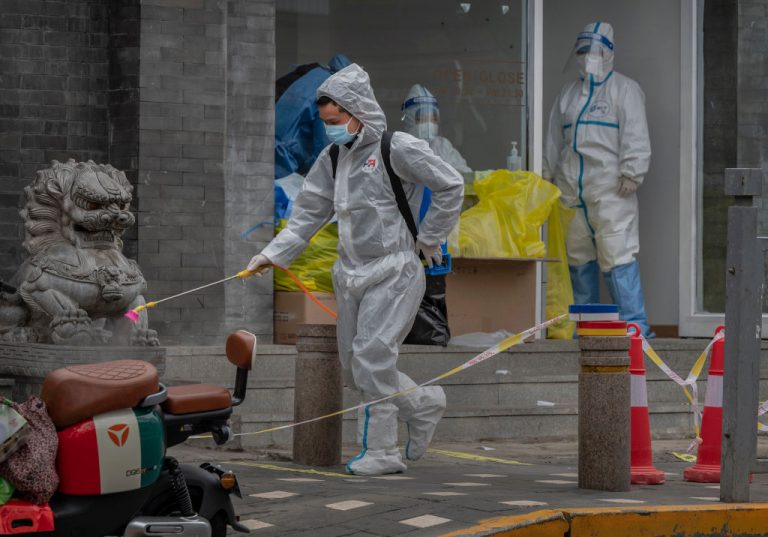In a notable move by a Chinese think tank, Anbound Research Center called on the country’s central government to loosen “zero-COVID” restrictions — citing an imminent “economic stall,” should the heavy-handed measures continue.
The since-deleted report, titled: “It’s Time for China to Adjust Its Virus Control and Prevention Policies,” claimed that prolonged lockdowns, movement curbs and travel restrictions were only serving to exacerbate the country’s worsening economy.
Publicly speaking out against the government or government-mandated policies come at a great risk in China, where even disagreeing with the authoritarian communist regime could result in arrest, jail time, or worse.
MORE ON CHINA’S ZERO-COVID POLICIES:
- Residents in China’s Guangxi Province Take to the Streets to Protest Draconian ‘Zero-COVID’ Policies
- Vacationers Stranded on China’s Hainan Island Plead for Food and Supplies as ‘Zero-COVID’ Lockdown Drags On
- 80,000 Vacationers in China’s Tropical Hainan Stranded by New ‘Zero-COVID’ Lockdown
- More Cities Go Under Lockdown as China Reports 1,456 ‘High’ and ‘Medium-risk’ Zones
The report, which was posted on Aug. 28 to Weibo and WeChat (two of China’s most popular social media and microblogging apps) specifically called on Chinese leader Xi Jinping’s government to focus on “shoring up sinking growth,” and noted that countries like the U.S., Europe, and Japan were recovering economically after lifting pandemic curbs and learning to successfully coexist with the virus.
“Preventing the risk of economic stall should be the priority task,” the think-tank said, adding that, “China’s economy is at risk of failing due to the impact of epidemic prevention and control policies.”
Success
You are now signed up for our newsletter
Success
Check your email to complete sign up
The report cited research conducted by a Shanghai physician named Zhang Wenhong who noted that the country’s focus should be on: “economic recovery and gradually integrating with the rest of the world.”
Founded in 1993, Anbound says it has provided key research and “served the Communist party’s central financial and economic leading group and provided statistics to government agencies and financial institutions” for nearly three decades.
Though the report gave no indication whether the findings were reflective of authorities who may also be unhappy with the soaring economic and psychological tolls of “zero-COVID,” the report urged top officials to reconsider the effects of virus controls ahead of the 20th Party Congress slated for Oct. 6.
The meeting, which will run through October and November, is expected to break precedent and see incumbent president Xi Jinping secure another five-year term as Party leader.
Grim economic outlook
Economists have warned that in order for China to recuperate its national economy, it will need to boost local growth — which sank by 2.5 percent in the first half of 2022 compared to a year ago. China’s economy is also reeling from banking and real estate crises that have affected millions of people.
In an attempt to recoup some of the losses stemming from unrelenting COVID lockdowns that have shuttered businesses and halted industrial output, struggling real estate developers have attempted to increase housing prices — resulting in a growing number of residents being unable to afford new properties, or opting to stop buying altogether.
MORE ON CHINA’S ECONOMY:
- Residents in China’s Henan Province Lose Access to Bank Accounts, Face Off With Police
- China Experiencing Worst Capital Flight in 7 Years, Manufacturers Also Hit Hard
- China Fights Uphill Battle to Rescue Its Economy While Keeping ‘Zero-COVID’
- 3 Evergrande Real Estate Executives Asked to Resign Over Unstable Loans
On Aug. 29, the southern megalopolis of Shenzhen — which is hailed as a technological and financial hub that borders Hong Kong — announced a three-day closure of some residential areas in order to curb a recent outbreak of COVID-19. Authorities added that all mass gatherings would be banned, and announced the shut down of the world’s biggest electronics market, as well as entertainment venues and gyms.
In addition, the government of Shenyang — the most populous city in China’s northeastern province of Liaoning that is home to over 8 million people — postponed the start of in-person classes for primary and high school students, citing an uptick in new COVID infections.
COVID curbs affecting everyday life
Meanwhile, ongoing travel curbs have kept most foreign visitors from being allowed to visit China — severely affecting the country’s tourism sector. The Chinese authorities have stopped replacing passports that expire and has called on the public to avoid traveling abroad, AP News reported.
Over 80,000 tourists found themselves stranded in the coastal province of Hainan earlier this month after the local government announced the cancellation of most flights due to a new outbreak of the virus prompting a lockdown in Sanya city.
Hainan, which is home to 10 million people and is about the size of Taiwan, lies to the south of the populous Guangdong Province and east across the Tonkin Gulf from Vietnam. Its tropical climate and beaches make the province a popular destination for Chinese vacationers.
On Aug. 26, the U.S. government canceled 26 flights from Chinese airlines in a dispute over Beijing’s unrelenting COVID protocols. Earlier last week, China forced American carriers to cancel the same number of flights after some passengers tested positive for the virus upon arrival in the country.
The Department of Transportation said on Aug. 27 that China had “violated an air travel agreement and treated airlines unfairly under a system that requires them to suspend flights if passengers test positive for COVID-19.”














